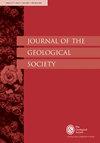Tectono-Stratigraphic Evolution of Salt-Influenced Normal Fault Systems: An Example From The Coffee-Soil Fault, Danish North Sea
IF 3
3区 地球科学
Q2 GEOSCIENCES, MULTIDISCIPLINARY
引用次数: 0
Abstract
We explore how the relationships between fault activity, salt movement and sediment loading affect the stratal geometry of the hanging wall throughout the evolution of a salt-influenced normal fault system. We examine a c. 65 km long portion of the Coffee-Soil Fault System in the Danish North Sea, the hanging wall of which has been partially influenced by a pre-rift unit of mobile salt. To constrain the tectono-stratigraphic evolution of this fault system, we combine structural observations with seismic stratigraphic analysis of the hanging wall growth strata. We find that the hanging wall of the Coffee-Soil Fault System shows major depocentre shifts through time, along with marked variability in the along- and across-strike stratal geometries. We explain how the development of these characteristics is influenced by: (1) the segmentation and linkage history of the fault system; (2) the evolution of the salt-cored cover monoclines above blind basement fault segments; and (3) changes in the location and rate of accommodation generated by the load-driven withdrawal of salt up the dip-slope of the hanging wall and by fault-related subsidence. Our findings have implications for structural and stratigraphic studies in salt-influenced rift basins, as well as for understanding the potential distribution of geo-storage and hydrocarbon reservoirs in such settings.盐影响的正断层系统的构造-地层演化:以丹麦北海咖啡-土壤断层为例
在盐作用的正断层系统演化过程中,探讨了断层活动性、盐运动和沉积物负荷之间的关系如何影响上盘的地层几何形状。我们研究了丹麦北海咖啡-土壤断裂系统中约65公里长的部分,其上盘部分受到了裂谷前活动盐单元的影响。为了约束该断裂体系的构造地层演化,我们将构造观测与上盘生长地层的地震地层分析相结合。我们发现咖啡-土壤断裂系统的上盘随着时间的推移显示出主要的沉积转移,以及沿走向和跨走向的地层几何形状的显著变化。这些特征的形成受以下因素的影响:(1)断裂系统的分段和联动历史;(2)隐伏基底断段上盐芯盖层单斜演化;(3)荷载作用下盐向上盘倾斜回撤和断层相关沉降引起的容纳量位置和容纳量变化。我们的发现对盐影响裂谷盆地的构造和地层学研究,以及对这种环境下地质储层和油气藏的潜在分布的理解具有重要意义。
本文章由计算机程序翻译,如有差异,请以英文原文为准。
求助全文
约1分钟内获得全文
求助全文
来源期刊

Journal of the Geological Society
地学-地球科学综合
CiteScore
6.00
自引率
3.70%
发文量
68
审稿时长
6-12 weeks
期刊介绍:
Journal of the Geological Society (JGS) is owned and published by the Geological Society of London.
JGS publishes topical, high-quality recent research across the full range of Earth Sciences. Papers are interdisciplinary in nature and emphasize the development of an understanding of fundamental geological processes. Broad interest articles that refer to regional studies, but which extend beyond their geographical context are also welcomed.
Each year JGS presents the ‘JGS Early Career Award'' for papers published in the journal, which rewards the writing of well-written, exciting papers from early career geologists.
The journal publishes research and invited review articles, discussion papers and thematic sets.
 求助内容:
求助内容: 应助结果提醒方式:
应助结果提醒方式:


